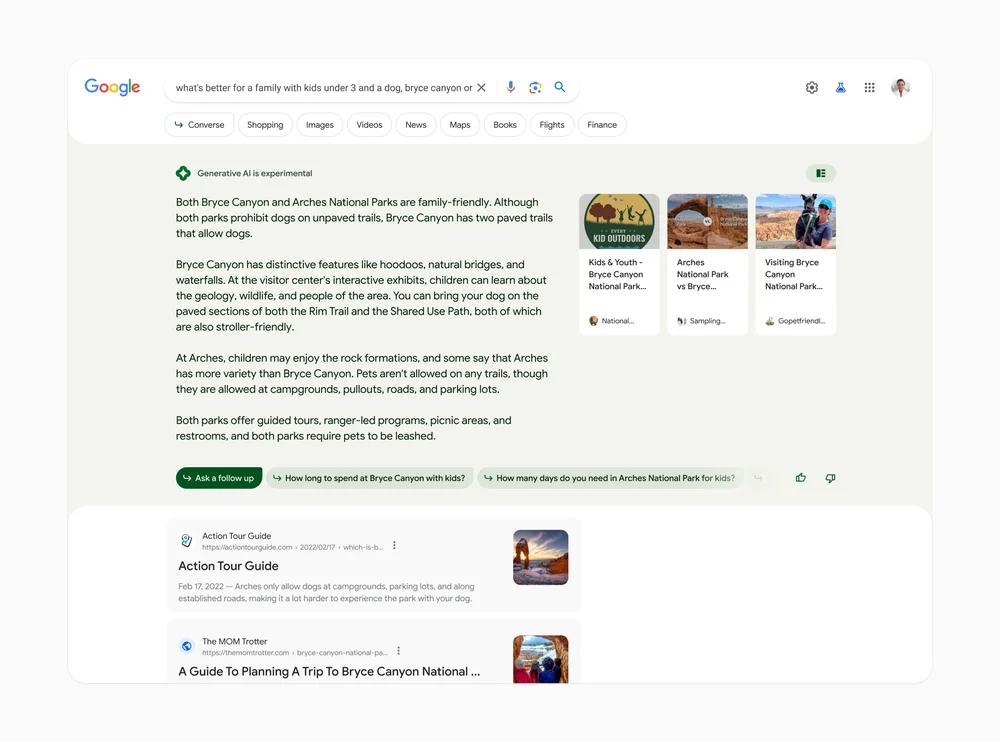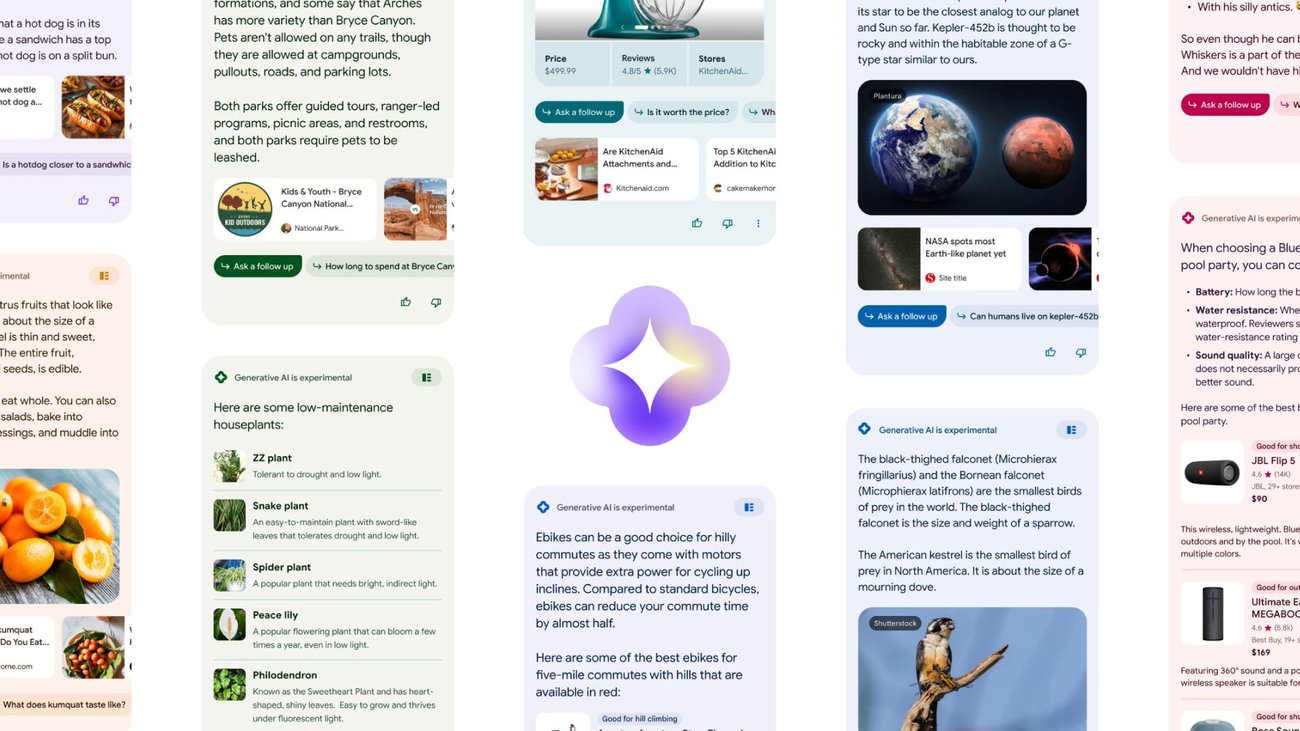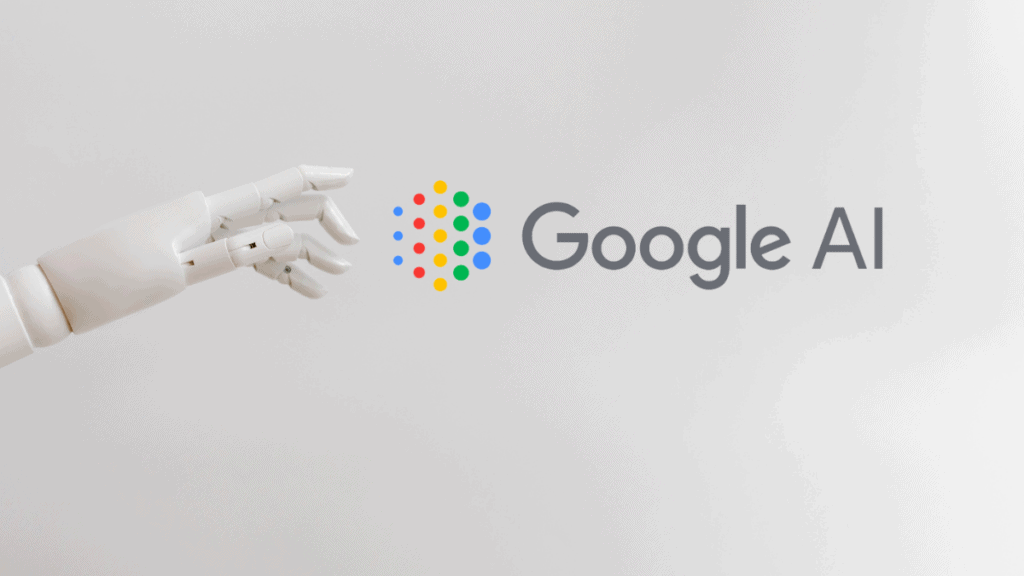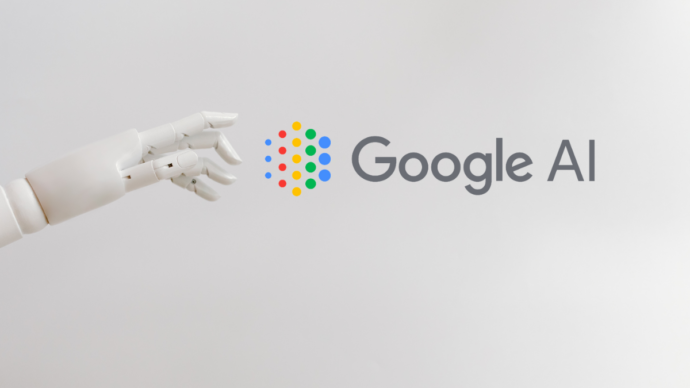As Google integrates generative AI into Search, we find ourselves on the cusp of a transformation that could redefine our online interactions.
With a multitude of fresh announcements – SpamBrain, Helpful Content, and an Extra E for EEAT – Google has once again proven its dedication to evolution. Their latest move? Integrating generative AI into its Search function. This development signifies a monumental technological leap, promising a revolution in how we search for and consume information online.
Such a substantial change naturally stirs anticipation and speculation. It also invites us to consider the profound implications this shift brings, particularly for digital marketers and businesses heavily reliant on Google’s search algorithms. This sentiment is echoed by Matthew Forzan, Co-Founder and Director of Yoghurt Digital, who shares his perspective:
“This is the biggest change to Google in the last 20 years and will forever change the behaviour of how people search.”
In the face of this transformative update, we are driven to explore its potential impacts and understand its ramifications for the future of digital marketing.

The Seismic Shift in Google Search
Google’s approach to search experiences has continually evolved over the last twenty years. However, no update has been as groundbreaking as the recent integration of generative AI into Google Search. This move signifies a seismic shift in Google’s approach, marking a radical departure from traditional search algorithms.
Generative AI, or Artificial General Intelligence (AGI), is an advanced form of artificial intelligence capable of understanding, learning, and applying knowledge in various tasks, much like a human brain. Google’s adoption of this sophisticated technology in its search function is a game-changer, even if they are a little late, with ChatGPT and Bing likely encouraging Google to hop online.
With generative AI, the search process transcends matching keywords and phrases. It comprehends the context and nuances of a search query, delivering more accurate and personalised results than ever before. This update does not merely present a new method of searching – it fundamentally alters how users interact with information online.
The repercussions of this shift extend far beyond user experience. For digital marketing agencies and businesses, this change has profound implications. As information retrieval methods evolve, so must the strategies used to make content searchable and relevant. Search Engine Optimisation (SEO), content creation, and digital marketing strategies must adapt to a landscape where generative AI dominates the search experience and zero-click searches become the norm.
Integrating generative AI into Google Search marks the beginning of a new era in digital information. As we stand on the precipice of this paradigm shift, we must prepare to navigate uncharted territory. This update presents challenges and exciting opportunities for those willing to embrace the revolution in search technology.
The SEO Perspective from Yoghurt Digital
Our Organic Search Department team – a diverse group of digital marketing specialists with varied roles and perspectives – has collected their initial thoughts and insights to prepare for this brave new world of generative AI-integrated search. From understanding the long-term implications for the agency to the immediate changes required in SEO, content creation, and overall strategy, the team provides invaluable insights into navigating this new terrain.
“A View from the Top: Matthew Forzan, Co-Founder & Director”

With a bird’s eye view of the digital marketing landscape, Matthew Forzan, Co-Founder and Director here at Yoghurt Digital, holds a perspective that combines extensive industry experience with strategic vision.
Matthew emphasises that this isn’t just another update – it’s an overhaul of the system that will “forever change the behaviour of how people search”. This prediction isn’t merely about technical alterations or changes to SEO best practices. Instead, it points towards a fundamental transformation in how users engage with online search. The ripple effects of such a change are set to permeate every corner of the digital landscape, reshaping user interaction with information and digital content.
For Matthew and Yoghurt Digital, this change isn’t just significant – it’s monumental. As an agency heavily reliant on Google for a substantial portion of its operations, successfully navigating this new terrain is crucial. Matthew recognises that Google’s integration of generative AI into its search function underlines the sheer magnitude of this revolutionary shift. The challenge ahead is significant, but there is the potential for growth, innovation, and a new chapter in digital marketing.

Anticipating the Organic Shift: Joe Alder, Head of Organic Search
Tasked with leading the charge in organic search, Joe Alder presents a detailed perspective on the integration of generative AI and a roadmap of potential implications in the coming months.

The SEO community has voiced concerns regarding SGE’s current capabilities. Several bugs have been reported, such as poor source attribution, absence of links to mentioned sites and products leading to a detrimental user experience and decreased website traffic, and the dissemination of potentially misleading or erroneous information through AI snippets. While Google’s guidelines limit generative AI integration with YMYL (Your Money Your Life) queries, there have been some exceptions, leading to further criticisms about SGE’s limited comprehension of user intent and the potential risks associated with inappropriate responses to YMYL queries.
However, it is important to note that SGE invariably includes a disclaimer stating that the information provided should not be considered medical, financial, or legal advice.
Fortunately, Google’s white paper on SGE distinctly communicates its commitment to ensuring “reliable, helpful and high-quality information,” particularly in dealing with YMYL queries. Therefore, the hope is that as the model evolves and improves, the instances of AI snippets spreading potentially misleading information will reduce.
Moreover, user-generated content, particularly reviews, will gain heightened importance in this new landscape, becoming crucial for building trust and authenticity in the AI-driven search era. As generative AI redefines the search experience, optimising content for crawlers, such as including a summary section at the top of articles, will be a necessary adaptation.
As a result, Joe anticipates that social media will play a more substantial role, making cross-publishing strategies key to increasing visibility and engagement.
Notably, Joe asserts the unwavering importance of technical SEO, alongside potential growth in Conversion Rate Optimisation (CRO) and User Experience (UX), emphasising the comprehensive nature of the upcoming changes in the digital marketing landscape.
Joe’s perspective underscores the need for agility and adaptability as digital marketers navigate this new organic search landscape. His insights provide valuable food for thought for those preparing to adjust their strategies in line with these upcoming shifts.
Content in the Age of AI: Chloe Kourganoff, Senior Organic Search & Content Specialist

Sitting at the forefront of creating content that attracts and resonates with audiences, Chloe’s insights on Google’s latest update reveal the direction content creation strategies might take in the age of AI integration.
Chloe Kourganoff focuses on an essential equation in this new era: Search equals Trust. EEAT – Experience, Expertise, Authoritativeness, and Trust – has always been a crucial principle in content creation. However, with this update, Chloe emphasises that its importance has heightened significantly. Companies’ and individuals’ tasks are to bolster their EEAT credentials – whether through detailed author bios, relevant qualifications, or other indicators of their authority and trustworthiness.
Chloe’s insights extend beyond SEO, encouraging businesses to view their online presence holistically. She suggests that to improve EEAT, brands must create a well-rounded and consistent image across various platforms. This includes maintaining active social media profiles, accruing positive reviews and backlinks, and ensuring a cohesive and professional online persona.
In Chloe’s perspective, content isn’t just about driving traffic – it’s about building trust and demonstrating expertise. Or, more importantly, connecting with your audience, your customers. As we enter the age of AI-driven search, these principles will form the bedrock of successful content strategies and production. Businesses and marketers must heed this call to adapt and elevate their approach to thrive.
SEO in the Age of Generative AI: Alex Mangona, Senior Content & SEO Specialist
A key concern for Alex Mangona, our Senior Content & SEO Specialist, pertains to the attribution of traffic via Google Shopping and how AI integration might affect this tracking.

Prioritising product structured data for clients should be a priority as it becomes even more integral to helping Google understand and categorise product information and making those products more likely to appear in AI-generated search results.
Furthermore, Alex highlights the importance of integrating blog content and products. Previously, due to potential difficulties such as 404 errors, businesses have been cautious about linking to products. However, with the arrival of generative AI, the need to build context and provide rich product information is more critical than ever.
A greater focus on product descriptions is also crucial in the age of generative AI. This isn’t limited to meta information but extends to on-page copy, suggesting that detailed, valuable, and optimised product descriptions will become critical to successful SEO strategies.
Alex’s insights extend to features like featured snippets in the Search Engine Results Page (SERP). She questions whether the new update signals an end to these features or a transformation in how they are generated. The prediction is that businesses may need to rethink their current strategies to accommodate these potential changes (more on that later).
The Write Perspective: Elliot Nash, Copywriter & Marketing Specialist

With his unique blend of copywriting and marketing expertise, Elliot Nash provides a fresh perspective on the potential implications of generative AI in Google Search.
Elliot advocates for including FAQs and adopting “featured snippet” techniques, predicting that these strategies may become even more critical to ensure that the information from our clients is featured prominently in Google’s generative AI responses.
Elliot also echoes Alex’s point on the increased significance of product descriptions. He believes this shift could particularly influence resellers, necessitating unique and engaging product descriptions to differentiate themselves from other retailers and manufacturers.
Customer journey examples are another strategy Elliot suggests considering in response to the introduction of Google’s conversational AI model. Such examples help businesses anticipate and respond to the various queries and needs a customer might have throughout their journey.
Reflecting on the upcoming update to Google’s helpful content system, Elliot points out its potential to unearth more “hidden gems” from forum threads, blogs, and other lesser-known sources of valuable content. This could mean businesses must take a more holistic approach to online presence, ensuring quality content in various forms and platforms, even if assisted by AI for SEO content generation (another paradigm shift in its own right).
Elliot’s insights underline the need for innovative and flexible strategies that consider not only SEO but also the quality of content and users’ evolving expectations in the age of AI.
Technicalities in the AI-Driven Era: Daniel Xu, Technical Organic Search Specialist
Technical Organic Search Specialist Daniel Xu shares an optimistic yet pragmatic outlook on the new era of AI-driven Google Search. He believes that the core ranking factors of SEO will remain relatively stable, with the emphasis still heavily resting on providing genuinely high-quality, thoughtful and helpful content.

In his own words, “The question shouldn’t be what we should optimise to find success in SEO, but how we can optimise our websites further.” For Daniel, the actual evolution lies in website optimisation, becoming more of an ‘entity’ rather than a mere platform. He states websites must exhibit the core attributes of Experience, Expertise, and Authoritativeness (EEAT), demonstrating social proof and active participation.
With the arrival of generative AI, users will have increased confidence in their searches, leading to a surge in long-tail keywords. This surge suggests a significant shift in the SEO landscape where regurgitating generic information and outranking competitors with backlinks may not suffice.
“Websites need to become more trustworthy with genuinely helpful content and outcomes,” Daniel emphasises, indicating a change in the value we place on factors such as backlinks, content word count, and internal linking. Trust signals such as reviews and on-site User Generated Content (UGC) could take on greater significance in this new era.
Daniel also underscores the importance of technical elements like structured data, indexability, page speed, and overall user experience, which he anticipates will become more critical in supporting the strength of other SEO factors.
Finally, Daniel reminds us that while we may need to be mindful of small changes like reduced Click-Through Rates (CTR), optimising for featured snippets, rich results, and so on, the best course of action is to be adaptable and proactive. He concludes, “The best we can do right now is to reflect on what Google tells us to improve with each update… until we can get our hands on this new feature to experiment and trial ourselves.”

Coordination in the Age of Change: Sabine Benefield & Laura Costa Organic Search Coordinators

In the face of the AI-driven evolution in Google Search, our Organic Search Coordinator, Sabine Benefield, sees an opportunity in this development. Sabine perceives this update as a culmination of Google’s various innovations, combining elements like Google Lens, Shopping, and Journeys with AI tools to create a more user-friendly search experience.
“It will be way more user-friendly, and I’m excited to see what we can do with it!” Sabine exclaims, demonstrating her enthusiasm for the forthcoming changes and their potential. She also acknowledges the competitive aspect of this update, noting how Google enthusiasts have been awaiting an answer to developments like ChatGPT and Bing AI.
Laura Costa, our Organic Search Executive, shares the enthusiasm for these developments, with her insights and perspective on the implications of this change to be provided soon. Together, they present a forward-thinking mindset, reminding us that staying ahead of the curve and embracing change is key in navigating the ever-evolving world of digital marketing.

Embracing the Future of Search
Change is the only constant in digital marketing and SEO, and the recent integration of generative AI into Google’s Search function is a testament to that truth. Our team at Yoghurt Digital has given their initial perspectives, revealing a keen understanding of the implications of this monumental update.
From Matthew Forzan’s view from the top to the detailed analyses of Joe Alder and Alex Mangona, Sabine Benefield’s enthusiasm and Daniel Xu’s technical insight, we are prepared to navigate this uncharted territory. These initial insights underline the collective understanding that adapting to these seismic changes is not merely an option but a necessity for any digital marketer or agency that intends to stay competitive.
However, as Elliot Nash pointed out, this change doesn’t spell the end for traditional SEO strategies. Instead, it opens up new avenues and challenges for us to tackle, to ensure that we continue delivering the best results for our clients. Chloe Kourganoff’s comments on Trust encapsulate the path forward – focusing on providing value, building authority, and earning the trust of both Google and our client’s target audiences.
In this era of revolutionary change, Yoghurt Digital reaffirms our commitment to staying at the forefront of developments. As we continue to learn more about the practical applications of generative AI in Search, we pledge to keep finding innovative solutions that align with these changes, delivering the same high-quality service that our clients expect from us.
To adapt and thrive in the changing landscape of Google Search, you need a partner who understands these changes and how to leverage them to your advantage. That’s where Yoghurt Digital comes in. Don’t hesitate to contact us to learn more about how we can help adapt your strategy in light of this significant change.
Embrace the future of search with Yoghurt Digital – your partner in navigating the uncharted waters of the digital marketing world.

